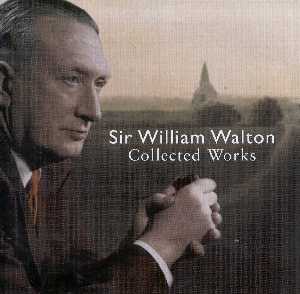Previn's Walton First Symphony, as recorded by RCA
in 1966, occupies a place of honour comparable with Previn's Rachmaninov
2 (EMI) from circa 1972. Brooding, rippling with untamed tension, restive,
impatient, sharply rhythmic in ignition and in recoil. Dynamic range
is wide; very faithfully put across by the RCA engineers both of the
sixties and of the millennium. So wide is the range that the quiet quiets
bring out the low and even surface noise. The recording wears its years
with a smile but triple forte moments can be harsh sounding.
The pulsation and beat of the performance can best be judged from the
finale - say from 1.20 onwards. This is a very special performance still
extremely competitive and borne out of a blast-furnace of creativity.
Much the same epithets and the same sparse demerits
can be applied to this Heifetz's second recording of the Violin Concerto.
While this one is still in mono it sounds well and benefits from a decade's
worth of extra opulence over Heifetz's Cincinnati recording of the same
work (now on a superb Naxos CD coupled with the Sargent conducted Elgar
concerto). I 'learnt' this concerto from a tape of the present RCA version
and so I know every nook and cranny of the recording. Whether the work
basks in sunshine (first movement), exults in exuberant life (second
movement) or celebrates beauty in crestfallen tragedy (finale) it does
so with bursting intensity. Heifetz could easily have fallen victim
to the sort of suffocating hamming up that mars his Korngold concerto.
Here however greater restraint is shown. Next to this I rate most highly
the Ida Haendel/Berglund version on EMI Classics which has the advantage
of stereo and twenty years technological progress. I also commend to
you the version recorded in the sixties by Zino Francescatti on Sony.
The second CD launches with Piatigorsky in the Cello
Concerto in its world premiere recording. This shares with the concerto
on the first disc the virtues of being played by the dedicatee. The
recording was made seven years after the Heifetz and is in early stereo.
It sounds rather well for its 45 years. It has been an object lesson
to me to hear this work again in the hands of Munch and the Bostonians.
The allegro appassionato goes tetchily, slashing and ripping
along. Piatigorsky is an emotional advocate for the work and it needs
this. He reminded me at times of Janos Starker's character in the solo
Cello Sonata by Kodaly (whatever happened to those Saga masters - one
for Regis to seek out perhaps?).
After three recordings where some analogue hiss is
in evidence it is almost a shock to be hearing at track 4 (CD2) the
digital richness and background silence of the Viola Concerto from 1994
and of the Conifer version of the Sinfonia Concertante. I knew all the
other tracks before this set arrived but the Bashmet/Previn was completely
new to me (has it been issued before?). Intriguingly this is Previn
with the same orchestra that recorded the Symphony almost thirty years
previously. He recaptures some of the snappy abandon of the 1966 Symphony
sessions in the vivo con molto preciso. Bashmet plays with considerable
feeling.
Kathryn Stott's recording was the first of the original
version of the Sinfonia Concertante which sports orchestration in which
light and air is let into the texture. The three movements reflect the
characters of the Sitwells - Osbert, Sacheverell and Edith. Brilliance
and romance flood these pages which strut and swoon with echoes of Constant
Lambert (Rio Grande - try 00.47 of the allegro molto),
Stravinsky (Petrushka), Bax (Winter Legends) de Falla
(Noches en las jardines de Espana) and Lord Berners (Caprice
Péruvien). It is fashionable to decry this early work but
for me it works far better than the Viola Concerto. The swooning and
brilliance must have appealed to the soloist in the premiere - the composer,
York Bowen. The first movement in primis is a work in which syncopation
(try 6.20) and romance achieve a perfect balance. Nostalgic songs half
remembered drift like wraiths through the andante. Stott is brilliant
though there is a touch of harshness in the rendering of her piano sound.
This is a very generous bargain price collection and
even if it costs you some duplication is worth your money. Only if you
are rootedly averse to non-digital recording should you think about
passing this by. Golden age Walton interpretation with only the Viola
Concerto leaving me unengaged.
Rob Barnett


